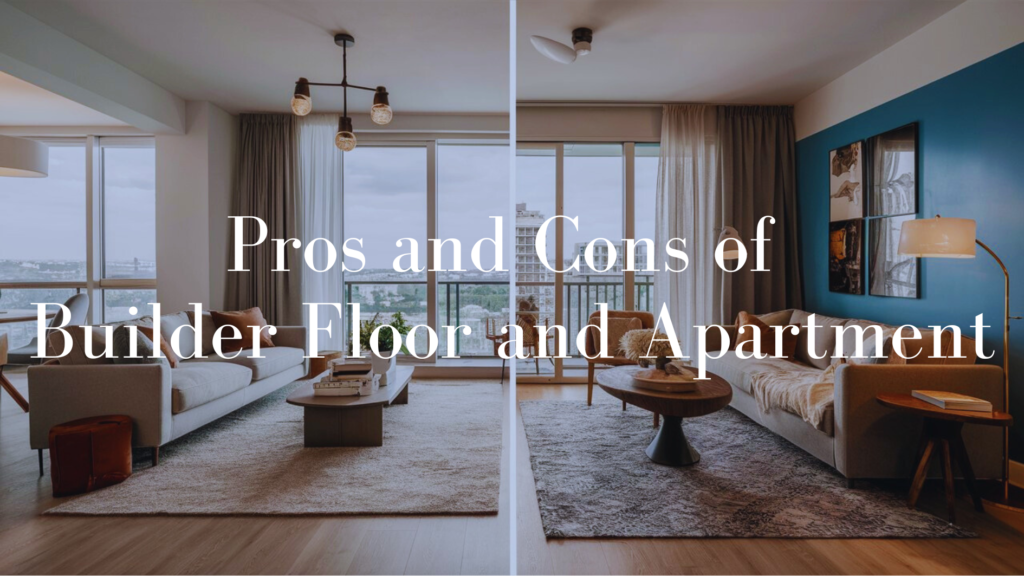Blogs
- Home
- Blogs
Pros and Cons of Builder Floors and Apartments

When choosing between builder floors and apartments in South Delhi, it’s essential to consider various factors that could impact your living experience. Each option offers a different set of benefits and drawbacks based on maintenance costs, amenities, privacy, resale value, and more. Let’s delve into the pros and cons of both to give you a clearer understanding:
What is a Builder Floor?
Builder floors refer to independent floor units in a low-rise building where each floor is usually sold as a separate dwelling unit. These are popular in areas where land availability is limited and are common in residential parts of South Delhi.
Advantages:
-
- Privacy and Independence: With fewer families residing in the same building, builder floors offer more privacy compared to apartments. You often get a separate entrance and more control over your floor.
-
- Exclusive Space: Often, you get exclusive rights to your part of the building, like a rooftop or a portion of the yard.
-
- Customization: There’s generally more scope for customization and making changes to the interior and exterior, as you own the entire floor.
-
- Lower Density Living: With fewer residents, the overall environment tends to be quieter and less crowded.
-
- Lower Maintenance Costs: Typically, the maintenance cost for builder floors is lower since there are fewer common amenities to upkeep.
-
- Individuality: Each floor can be uniquely designed, offering more room for customization.
Disadvantages:
-
- Limited Amenities: Builder floors lack the extensive amenities often found in apartment complexes, such as gyms, swimming pools, and community halls.
-
- Security: Generally, builder floors do not have the same level of security features as apartment complexes, such as 24/7 security personnel, CCTV surveillance, etc.
-
- Self-Managed Maintenance: The responsibility for repairs and maintenance of common areas often falls directly on the residents, which can be a hassle.
-
- Resale Challenges: Builder floors can sometimes be harder to sell, particularly if they lack the amenities and brand recognition of larger apartment complexes.
What is an Apartment?
Apartments are part of larger complexes with multiple units housed within high-rise buildings. They are designed to accommodate more families with shared walls and common areas.
Advantages:
-
- Amenities: Apartment complexes typically offer a wide range of amenities, including gyms, swimming pools, playgrounds, community centers, and more, which can enhance your living experience.
-
- Security: Higher levels of security with CCTV, security personnel, and controlled access points are standard in most apartment complexes.
-
- Community Living: Living in an apartment complex offers a sense of community and opportunities for social interaction.
-
- Maintenance: The maintenance and upkeep of common areas and facilities are managed by the housing society or a maintenance team, relieving individual residents of this burden.
Disadvantages:
-
- Higher Maintenance Costs: The cost of maintaining common amenities is shared among all residents, leading to higher monthly maintenance fees.
-
- Less Privacy: With shared walls and common areas, apartments offer less privacy compared to builder floors.
-
- Regulation and Restrictions: There are generally more restrictions on the extent to which you can customize your apartment due to building regulations and society rules.
-
- Space Constraints: Apartments may have less living space and smaller balconies compared to builder floors.
Conclusion
The decision between choosing a builder floor or an apartment in South Delhi depends on your priorities. If you value privacy, customization, and a lower density of neighbors, a builder floor might be more suitable. On the other hand, if you prefer a community lifestyle with access to various amenities and higher security, an apartment complex could be a better fit. Both options have their unique advantages and drawbacks, and your choice should align with your lifestyle preferences and needs.
FAQs (Frequently Ask Questions)
Q1. What is a builder floor?
A builder floor typically refers to a residential unit in a low-rise building that occupies a single floor or part of a floor. These buildings usually have fewer units compared to high-rise apartments, offering more privacy and exclusivity.
Q2. What is an apartment in a high-rise building?
An apartment in a high-rise building is a residential unit located within a complex that may house many apartments spread over several floors. These buildings often come with shared amenities and are managed by a homeowners’ association.
Q3. Which is better for families, a builder floor or an apartment?
This depends on the family’s preferences for space, privacy, and amenities. Families with young children might prefer apartments for their community feel and recreational facilities, while those prioritizing space and quieter surroundings might opt for builder floors.
Q4. How do maintenance responsibilities differ between builder floors and apartments?
In builder floors, maintenance responsibilities often fall more directly on the homeowner, which can include upkeep of common areas and the building exterior. In contrast, apartment dwellers typically pay a maintenance fee that covers these services, making it less hands-on.
Q5. How do I choose between a builder floor and an apartment?
Your choice may depend on your personal preferences, family needs, budget, and lifestyle. If you prioritize amenities, security, and community living, an apartment might be more suitable. If you prefer privacy, customization, and lower ongoing costs, a builder floor might be a better fit.
